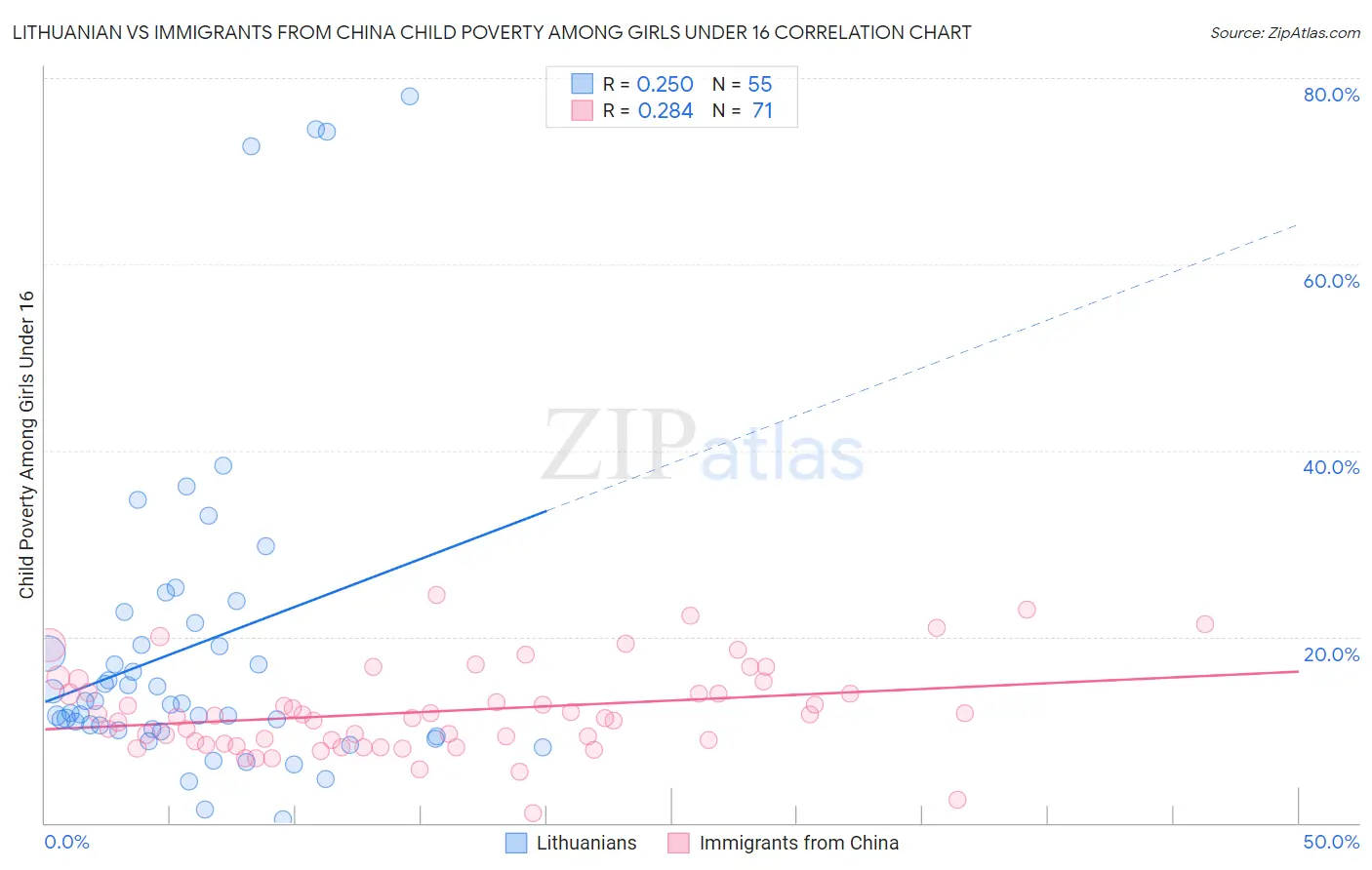Lithuanian vs Immigrants from China Child Poverty Among Girls Under 16
COMPARE
Lithuanian
Immigrants from China
Child Poverty Among Girls Under 16
Child Poverty Among Girls Under 16 Comparison
Lithuanians
Immigrants from China
13.9%
CHILD POVERTY AMONG GIRLS UNDER 16
99.6/ 100
METRIC RATING
37th/ 347
METRIC RANK
13.4%
CHILD POVERTY AMONG GIRLS UNDER 16
99.8/ 100
METRIC RATING
25th/ 347
METRIC RANK
Lithuanian vs Immigrants from China Child Poverty Among Girls Under 16 Correlation Chart
The statistical analysis conducted on geographies consisting of 410,552,780 people shows a weak positive correlation between the proportion of Lithuanians and poverty level among girls under the age of 16 in the United States with a correlation coefficient (R) of 0.250 and weighted average of 13.9%. Similarly, the statistical analysis conducted on geographies consisting of 445,396,670 people shows a weak positive correlation between the proportion of Immigrants from China and poverty level among girls under the age of 16 in the United States with a correlation coefficient (R) of 0.284 and weighted average of 13.4%, a difference of 3.3%.

Child Poverty Among Girls Under 16 Correlation Summary
| Measurement | Lithuanian | Immigrants from China |
| Minimum | 0.39% | 1.1% |
| Maximum | 78.0% | 24.4% |
| Range | 77.7% | 23.3% |
| Mean | 19.1% | 12.0% |
| Median | 12.8% | 11.4% |
| Interquartile 25% (IQ1) | 9.9% | 8.6% |
| Interquartile 75% (IQ3) | 21.5% | 14.0% |
| Interquartile Range (IQR) | 11.6% | 5.4% |
| Standard Deviation (Sample) | 17.8% | 4.7% |
| Standard Deviation (Population) | 17.6% | 4.7% |
Demographics Similar to Lithuanians and Immigrants from China by Child Poverty Among Girls Under 16
In terms of child poverty among girls under 16, the demographic groups most similar to Lithuanians are Russian (13.9%, a difference of 0.020%), Immigrants from Northern Europe (13.8%, a difference of 0.17%), Immigrants from Moldova (13.9%, a difference of 0.30%), Immigrants from Australia (14.0%, a difference of 0.95%), and Immigrants from Sri Lanka (14.0%, a difference of 1.0%). Similarly, the demographic groups most similar to Immigrants from China are Immigrants from Eastern Asia (13.4%, a difference of 0.46%), Norwegian (13.3%, a difference of 0.55%), Indian (Asian) (13.3%, a difference of 0.72%), Eastern European (13.5%, a difference of 0.78%), and Latvian (13.5%, a difference of 0.81%).
| Demographics | Rating | Rank | Child Poverty Among Girls Under 16 |
| Assyrians/Chaldeans/Syriacs | 99.9 /100 | #21 | Exceptional 13.3% |
| Indians (Asian) | 99.9 /100 | #22 | Exceptional 13.3% |
| Norwegians | 99.9 /100 | #23 | Exceptional 13.3% |
| Immigrants | Eastern Asia | 99.9 /100 | #24 | Exceptional 13.4% |
| Immigrants | China | 99.8 /100 | #25 | Exceptional 13.4% |
| Eastern Europeans | 99.8 /100 | #26 | Exceptional 13.5% |
| Latvians | 99.8 /100 | #27 | Exceptional 13.5% |
| Tongans | 99.8 /100 | #28 | Exceptional 13.6% |
| Bolivians | 99.8 /100 | #29 | Exceptional 13.6% |
| Asians | 99.7 /100 | #30 | Exceptional 13.7% |
| Turks | 99.7 /100 | #31 | Exceptional 13.7% |
| Danes | 99.7 /100 | #32 | Exceptional 13.7% |
| Swedes | 99.7 /100 | #33 | Exceptional 13.7% |
| Maltese | 99.7 /100 | #34 | Exceptional 13.7% |
| Immigrants | Northern Europe | 99.6 /100 | #35 | Exceptional 13.8% |
| Russians | 99.6 /100 | #36 | Exceptional 13.9% |
| Lithuanians | 99.6 /100 | #37 | Exceptional 13.9% |
| Immigrants | Moldova | 99.6 /100 | #38 | Exceptional 13.9% |
| Immigrants | Australia | 99.5 /100 | #39 | Exceptional 14.0% |
| Immigrants | Sri Lanka | 99.5 /100 | #40 | Exceptional 14.0% |
| Immigrants | Bolivia | 99.5 /100 | #41 | Exceptional 14.0% |